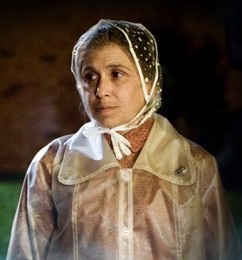How Wizards Do Money: Arabella Figg

When Arabella moved to the house on Wisteria Walk she began referring to herself as Mrs. Figg; of course she never said anything to Dumbledore about it, since she never had to re-introduce herself to him the way she had to establish her history among the neighbors — just say Mrs., look a bit sad sometimes, they’ll come to their own conclusions — but the owls started arriving late at night addressed to Mrs. Arabella Figg all the same.
Up until Wisteria Walk, Arabella had still held out hope that someone might one day look at her with something besides a quick assessment of her capabilities. And failings, of course, hard not to notice her lack of a wand, but she had worked hard to make sure her talents were still what people saw first, and not what they tacked on as an afterthought.
She made sure that when people said “she’s so clever,” it wasn’t because they were surprised.
Arabella knew she wouldn’t get a lot of notice, not in a community where most people built friendships and paired off in House Common Rooms she wasn’t allowed to enter. It wasn’t so much told to her directly as it was something she discovered when she turned eleven and all of her friends left the village. She received one letter, about Sorting Hats and moveable stairs, and then nobody thought her important enough to include in the conversation.
So she decided to become important on her own.
The Figgs are not a Noble and Ancient House, and they do not have a noble and ancient fortune. Arabella’s mother took in washing. Arabella helped, and afterwards she grabbed fistfuls of her apron in her hands to dry them off because she couldn’t afford to smudge her books. If magic was closed to her, she would learn history and mathematics. The second summer her friends came back, Arabella dared them to a sums contest: they could use enchanted quills, and she’d still beat them all using nothing but her own head.
She won. Closed her eyes tight and shouted out the answers.
Arabella first began breeding cats when she was fourteen. The muggle libraries had significantly better books than the wizard ones, and that’s where Arabella began studying biology (a subject that she would realize later her peers were never taught). She knew that there was plenty of demand for half-Kneazle cats — since, unlike full Kneazles, you did not need to pay for a license to own one — and although there was already a village Squib selling half-Kneazles, or sometimes one-third-Kneazles, or sometimes a cat that barely looked Kneazle at all but cost the same, Arabella suspected she could do a better job.
Later, when people asked what her secret was, she smiled and said “magic.”
Arabella began making enough money as a cat breeder that she was able to help her mother retire. She began selling her “purebred half-Kneazles” to the middle-class wizard market, mostly to parents of young girls who wanted Kneazle cats so badly but were satisfied enough with the less expensive substitute. She traveled with a portfolio of cats she had photographed herself, and, as with her breeding efforts, she kept track: if a single photo did not receive at least one positive comment in two home visits, she swapped it out.
All this time Arabella kept coming back home to the village, kept climbing up the stairs to her childhood bedroom. She knew at some point in the story a man was supposed to arrive. Maybe she would get onto a train and he would enter her compartment. Maybe she would go to a friend’s wedding and he would ask her to dance. Arabella had calculated the odds, roughly. Most wizards married before they were 25. Nearly all were married before they were 30. It would happen simply because it was too improbable not to happen. Especially to someone like herself, who had worked her whole life to make sure she was just as good as any wizard.
When Arabella was 33, she decided to try and put herself directly in the path of the type of man she might want. She joined the Order of the Phoenix. That took some convincing, but she hadn’t spent her childhood figuring out ways to outsmart people for nothing, and the other members of the Order quickly recognized her value.
Though she finally found the group of people who would be her friends for life, it seemed like whatever innate magic had eluded her at birth (technically, at conception) was still absent. She was important, she was successful, she was keeping the wizarding world safe, she was among brilliant and interesting peers, but the man, whomever he was — and she hoped for a long time it would be Alastor Moody — never noticed her.
So Arabella solved the problem for herself just as she had done when she was a child. “I’m Mrs. Figg,” she said when she introduced herself on Wisteria Walk.
“I’m Harry,” said little Harry Potter.
Previously: Anthony Goldstein
Support The Billfold
The Billfold continues to exist thanks to support from our readers. Help us continue to do our work by making a monthly pledge on Patreon or a one-time-only contribution through PayPal.
Comments